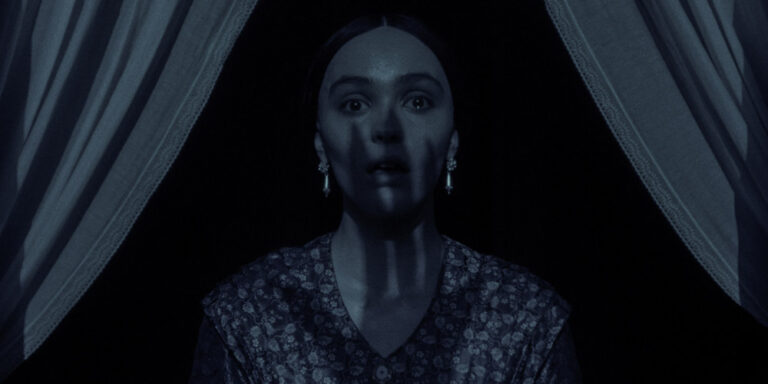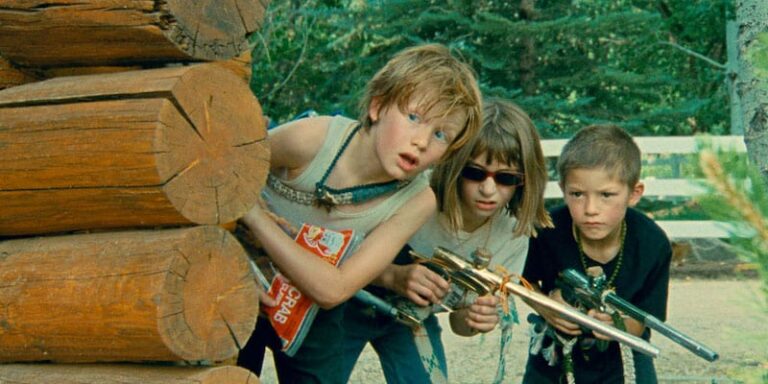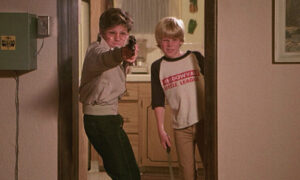Directed by Manuela Martelli
Written by Manuela Martelli and Alejandra Moffat
Starring:
- Aline Küppenheim as Carmen
- Nicolás Sepúlveda as Elías
- Hugo Medina as Father Sánchez
- Alejandro Goic as Miguel
- Carmen Gloria Martínez as Estela
- Antonia Zegers as Raquel
Rating: ![]()
A high dose of abstruse semiotics is injected into this esoteric Chilean film, a searingly political and aesthetically mature autopsy on human ethics in times of paranoia and uncertainty. The deceptively passive plot takes place in 1976, three years after the overthrow of Salvador Allende’s socialist government in a military coup d’état perpetuated by commander-in-chief Augusto Pinochet. Debutant Manuela Martelli directs her first feature film without vainglory, without conspicuous aestheticism and without the pretentious monotony to which most first-time filmmakers succumb. The historiographical scrutiny developed in the thesis of Chile ’76 has an intimate scope, it legitimately aims to study the post-1973 Chilean society from the domestic complexity, far from the collective struggle and the generalized social repercussions; here the trauma is evoked from the familiar environment of a single character. Optimally, Martinelli ventures into symbolic density and abandons the self-evident. Thus, elaborating a film that narrates the inner conflicts of a woman through abstract visual patterns; some perhaps too opaque but the others are meritoriously composed to condense a thrillingly courageous psychological drama that exposes exogenous neuroticism in times of tyranny.
Carmen, played with emblematic fortitude and principle of resistance by Aline Küppenheim, is a bourgeois woman who lives in Santiago, is married to a reputable doctor and has two adult children. During the winter of 1976, she decides to spend some time off at her summer house, which is under renovation. Her day-to-day life basically consists of spending time with her three grandchildren, making sure everything is in order in the house, and enjoying lunches and conversations with her family. The priest of the small town, Father Sanchez, played by Hugo Medina, asks Carmen to be a good Samaritan and help him with an injured man he has hidden so the authorities won’t arrest him. Carmen’s medical knowledge and her vocation for humanistic actions force her to accept that risky task. In times of political persecution, disappearances and draconian surveillance, Carmen understands perfectly well the danger she is exposed to; she does not know who this wounded man is, nor how he has been wounded. Little by little she discovers the obvious, but her bravura is not enough to withstand the experience, she fears not only for her family but also for the growing threat of a country subjected to uncertainty. Likewise, a society where amorality saves you and silence makes you complicit. Carmen represents the middle ground in the ethical turmoil that is experienced in totalitarian regimes.
Aline Küppenheim’s conscientious performance, with her distraught and alienated face, commands the story with the same visual abstractions allegorized by Manuela Martelli’s flawless direction. The introductory minutes of Chile ’76 prepare us, and alert us, that the taut and mysterious events that will devour the plot in the subsequent acts will be treated with an ominous simplicity. The cinematic minimalism proposed by Manuela Martelli is that of a narrative asceticism that is discomfiting and placid in equal measures. Initially, the plot is constructed with an austere use of off-camera space, and a visceral use of diegetic sounds that install an extremely physical realm. Then, when suspense holistically governs the naturalistic atmosphere of Carmen’s existence, the physical pragmatism is expunged to give way to an elusively oneiric, perplexing and delirious metaphysical space. It is one of those films where a plethora of things happen, yet we see nothing. The artfulness of the filmmakers of Chile ’76 is their minimal interference in storytelling matters; like a psychedelic trance, the more detached from the material world you are, the more genuine the experience will be. Carmen encounters peculiar characters during her surreptitious actions, these characters have a fleeting on-screen participation, but are a creepy embodiment of Carmen’s apprehensions and repressed personality.
The evolution of this nightmare is quasi-Hitchcockian, the sensuous cinematography and its exquisite color palette in conjunction with a baroque sound design allude to specific moods in the plot. Red, the most dominant of all, plays a hybrid role, a lethal mix of provocation and eroticism. Arguably, few will see the erotic imagery in the transfixing mise-en-scène and the implicit romance of the luxurious bourgeoisie’s life with idleness, yet it is essential to make it noticeable because the story has an intense dependence on these visual schemes that assiduously seek to engender symbolic associations. Cryptic or not, Martelli firmly wants to state something of an urgent nature, and I consider that in each brooding frame within a frame, color by color, movement by movement, everything is intertwined in something figurative, the aftermath of political volatility. It is invariably daring to play with the philosophy of imagery with this amount of audacity; however, when a film is assembled with such ambiguity as an intellectual and emotional procedure to chronicle a significant event, the positive results are limitless. Watching Carmen in a state of despair while sustaining a spurious stability in the utopian beauty of the bourgeoisie is an absorbing, evocative and wistful affair.
Chile ’76 wants to disappoint you, that much is clear to me. First and foremost, the audience must understand that this film is the opposite of an enlightening, didactic and entertaining time at the movies. With the same deconstructive incitement of the French New Wave cinema, Martelli makes a historical deconstruction from the intimacy of memory; therefore, the narrative is closer to the textures of subjectivity than to the textures of the objectivity. Act by act, we see a controlled story with potent anti-climaxes. At the exact moment we foolishly believe that the parameters of the script will be elevated to that of an action-packed thriller, the opposite transpires. That heightened level of tense adrenaline meticulously produced by the circumstances of unpredictability is reduced to nothing. There’s nothing menacing that actually makes a flesh-and-blood presence in the plot; the anti-climax that dominates the script is there so as not to adulterate the austerity of its underlying message. In the end, it feels more like a perfect PhD thesis in reflective filmmaking and cinematic semiotics than a film per se. However, it is an unfathomable material whether on screen or on paper. The central conceit subverts the mechanics of the contemporary thriller, and theoretically, it leaves me with the eminent impression of being in front of a film with the potential to be a masterpiece.
Chile ’76 is a film as political as it is apolitical, that is to say, the critical apparatus is that of an avowedly political manifesto but in practice, in the tangible physicality there is nothing perspicuous, just as in the diffuse world of memories, everything is blurred, only certain sensations can be felt, evoked. The humbly heroic feminism implanted in its moral dilemmas compels us to view this film from various fields of interdisciplinary viewpoints, allusions that help us rationalize the contemporary context in a visual, amphibological phenomenology. Unnervingly, it is as if the film refuses to be unveiled; something in its evasive muteness and secrecy seems to be allegorizing the repressive apprehensions that plague a society living under the scrutiny of totalitarianism. There is so much in so little, that is what captivates my curiosity to decipher the hidden. The radical, conjectural use of spatial emptiness and temporal ambiguity in the elusive mise-en-scène resolves nothing, it evades resolution with its anti-narrative abstraction and potent anti-climactic voids with the same intellectual aloofness of Michelangelo Antonioni’s formal modus operandi, leaving us with the formidable burden of resolving speculations in the infinite spectrum of discussions. The transcendent intimate observation of the political without using the rhetoric of the explicit is an enigmatic and authentic style that certifies Manuela Martelli as an exceptional visual storyteller. Audacity is demanded for this kind of cinema, and here it is fully embraced.









